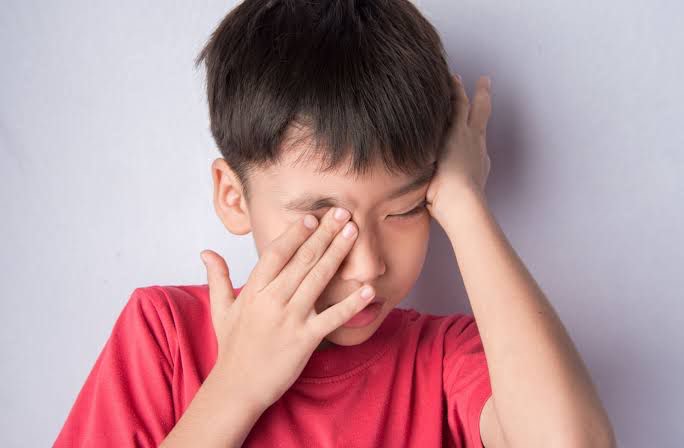
Why Do We Rub Our Eyes?
When your eyes are itchy, it is tempting to rub them. Though it may seem harmless but rubbing releases histamines, which make the itching worse, which in turn leads to more aggressive eye rubbing.
Rubbing your eyes isn’t all bad. It releases more tears, which in turn causes the meibomian glands, situated within your eyelids, to secrete much-needed oil into our eyes and that adds moisture and protects our tears from evaporating. Also, rubbing your eyes can be therapeutic, as pressing down on your eyeball stimulates the vagus nerve, which decreases your heart rate, thus relieving stress. However, the disadvantages outweigh the benefits because too much rubbing can be bad for your eyes and your vision.
Eye rubbing on and off throughout the day is a sign that something needs to be addressed. In the meantime, the very act of rubbing your eyes may provide temporary physical relief, while simultaneously causing further damage.
If you find you are rubbing your eyes more than just once or twice per day, contact your Optometrist or your ophthalmologist and schedule an appointment.
Some of the most common causes of constant eye rubbing include:
- Unaddressed allergies
- Sleep disturbances or insomnia
- Contact lens irritation
- Vision issues (refractive errors) that need correction
- The wrong vision prescription
- Dry eyes
- Blepharitis (infected or irritated eyelids, styes)
- Having a cold or flu
Reasons Why You Shouldn’t Rub Your Eyes
- Cornea scar
If your eye has something in it, even the smallest particulate matter, the act of rubbing your eyes is like sandpaper on a piece of wood. The scary thing is that unlike the feeling of rough and abrasive sandpaper, your eyes don’t always feel the micro abrasions caused when microparticles are rubbed back and forth across the eye’s surface. Over time, chronic eye rubbing causes micro-scratches on the cornea, and those small scratches accumulate to cause serious damage. In the beginning, a scratched cornea may cause eye-watering, redness, and light sensitivity. If the damage becomes worse, the cornea can become infected or develop scar tissue. In worst-case scenarios, severe cornea scratches lead to permanent vision problems.
- Thinning of the cornea.
Perfect vision requires a healthy cornea, with a healthy network of collagen fibers that maintain its spherical shape. The more you rub your eyes, the more that corneal surface is abraded, which breaks down the collagen fiber network. The cornea can become thin and may also begin to change shape, bulging out to form more of a cone shape than a round one. This condition is called keratoconus, a serious condition that can lead to distorted vision and ultimately the need for a corneal transplant or specialized contact lenses, such as scleral lenses.
- Eye infections can occur when you rub your eyes
As you can imagine, a scratched or thin membrane makes the eye more prone to infections, including fungal infection. While the eye has an amazing series of protective measures in place it is not immune to infections. If your eyes are inflamed and scratched, or if the “wrong” bacteria transfer from your hands to your eyes, there’s a higher risk of eye infection. Practice hand washing as regularly as possible, and make a conscientious effort to wash your hands with warm, soapy water – and then dry them – before rubbing your eyes.
- Dark circles and wrinkles
Are you prone to dark circles under or around your eyes? While genetics certainly play a role, as can certain medications, anemia and age, dark circles are most commonly a side effect of poor sleep habits and/or fatigue. And, while it may feel satisfying to give your eyes a good rub to soothe them and release a new, moist, batch of tears – rubbing exacerbates dark circles. Excessive eye rubbing can cause tiny blood vessels to break, resulting in bloodshot eyes, dark circles and wrinkles around the eyes. That same delicate skin around the eyes can be stretched out by continuous rubbing, which stretches and loosens the skin – and that leads to wrinkles.
- It can worsen glaucoma
Glaucoma is the leading cause of vision loss. While it can emerge at any age, it is most often seen in patients 35 years and older. Though glaucoma affects the optic nerve at the back of the eye, it is treated by relieving excessive pressure in the eye called intraocular pressure. Studies have shown that rubbing the eyes causes rather severe fluctuations in pressure inside the eye, and this is the direct opposite of what we want to achieve, to relieve pressure.
- Increases histamine levels
Histamines are released to help your body fight inflammation responses, especially those caused by allergies. Unfortunately, the histamine response can go into overdrive during allergy season, making allergy symptoms even worse than they need to be. While the relief experienced during the eye rubbing session can feel immensely satisfying, you’ll experience worse discomfort within seconds or minutes of rubbing your eyes because even more histamines are released as you rub the eyes.
How to Stop Rubbing Your Eyes
Keep your eyes hydrated by using artificial tears or eye drops such as antihistamines and mast cell stabilizers which can be prescribed by your Eye Doctor to help prevent the itchy feeling that leads you to instinctually rub your eyes. Excessive eye rubbing, whether due to chronic dry eye, itchy eyes, or habit, should be addressed to prevent any ocular and vision damage.
Do you find yourself rubbing your eyes multiple times a day? Give your eyes a break by scheduling an eye appointment with your optometrist or ophthalmologist.
